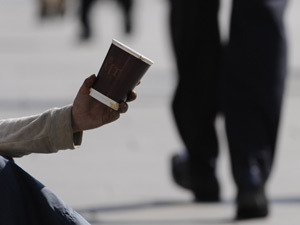Swedish News:
Why Swedes want to work at Ikea. Tougher attitude towards beggars.
-
 Did you turn off your lights during Earth Hour last weekend? Not many Swedes did.
Did you turn off your lights during Earth Hour last weekend? Not many Swedes did. -
-
Why Swedes want to work at Ikea
Reliable, secure, and honest – that’s what we want from our employers. And where might we find someone with these attributes? Why, at Ikea of course. The Swedish furniture giant has taken some hits in the press lately, but still has a place in the hearts of Swedish employees. A survey, commidssioned by Randstad recruiting company, shows that Swedes look at Ikea as the most attractive employer. Over half of the 8,000 persons polled, said they’d want to work for Ikea. Karin Bergman, Director of Ikea Sverige’s Human Resources, points to three factors she believes is behind the company strong image among Swedish employees: Developmental possibilities, security, and values. ”Most important is our culture and our human values, which I think attract people, and which are also connected to our vision to create a better living for many people,” she says. After Ikea, Sveriges Television (Swedish Television) is popular among employees, as is, on third place in the survey, Sveriges Radio (Swedish Radio). In both these public service companies, it is mostly the ”interesting work content” and ”pleasant working environment” that the persons polled thought attractive. The survey was conducted online during November and December last year, and built on the answers from 8,001 employees in the 18-65 age group regarding the 150 biggest employers in Sweden. Top 5 most wanted employers:
1. Ikea (53%)
2. SVT (48%)
3. SR (46%)
4. Volvo PV (40%) and
5. ABB (39%). -
 Ikea – the ideal employer if you ask Swedes.
Ikea – the ideal employer if you ask Swedes. -
-
No Earth Hour for Swedes
Most Swedes did not bother to turn off the lights during Earth Hour, which took place on March 29. According to statistics from the website elstatistik.se, which compared the household use of electricity on Saturday night with the past 51 Saturdays, the consumption of electricity was 15.6 gigawatts Saturday at 8:30 p.m. This is actually slightly more than the average consumption on a Saturday at that hour, which is 14.8 gigawatts. The consumption of electricity during Saturday evening was constant until 9:20, when it did a jump downward about 700 megawatts. ”The conclusion we can draw from this, is that not too many people turned off the lights during Earth Hour. That the consumption decreased after 9:20 p.m. most probably has to do with the fact that it usually decreases at that time,” says Harald Klomp from elstatistik.se. When asked if he was surprised, he said: ”Yes, a little, given the huge amount of attention Earth Hour has received. Lights alone admittedly only cover about 10 percent of an individual’s consumption of electricity, so even if everyone turned off the lights the total effect wouldn’t be that great. It’s more of a symbolic gesture.” -
 Beggars can now be seen on the streets in many Swedish cities, but there’s an unpleasant irritation growing among the Swedes aimed towards the beggars.
Beggars can now be seen on the streets in many Swedish cities, but there’s an unpleasant irritation growing among the Swedes aimed towards the beggars. -
Bankruptcies
For the fifth month in a row, the number of bankruptcies decreased in Sweden. It is now at its lowest level since 2008, according to statistics from the credit reporting agency Creditsafe. -
Tougher attitude toward beggars
Gangs attack them with stones, shop owners throw water on them, and there are instagram accounts calling them ”social decay”. According to police, there’s a growing discontent towards beggars in Sweden. ”One man got annoyed at a beggar and pushed her onto her back,” says Thomas Agnevik, spokesperson for the police in Östergötland. And that’s just one incident among many, lately. Agnevik continues: ”We’ve predicted this development of events. The irritation among the people is growing, meanwhile the beggars are becoming more offensive.” He believes the latter has to do with beggars feeling desperate. The public has gotten used to them and has found ways to walk around them as to not have to confront them, which in turn has led to the beggars trying new things. Police receive reports about beggars following people, tugging at their clothes. ”They become offensive so that people notice them,” says Agnevik. He also says beggars want nothing to do with police, and rarely report incidents; as in the case with the woman who was pushed. This means there’s no statistics showing how many beggars have been confronted like that. In Stockholm, beggars have to a great degree ”established themselves”. Explains Johan Lundström, police inspector at Klara in Stockholm: ”I hear of people who complain and don’t think it looks good with all these beggars.” There aren’t as many beggars in the south of Sweden, but there’s a similar problem in Göteborg, where irritation too is brewing: ”They get their cups knocked over and people scream at them,” says Faktum’s Editor in Chief Aaron Israelsson. He believes people feel concerned by this ”type of misery”. Lars Christensen is a police inspector in Göteborg, and he says: ”We have not noticed a change, but there are still those who step or spit on them.” -
-
